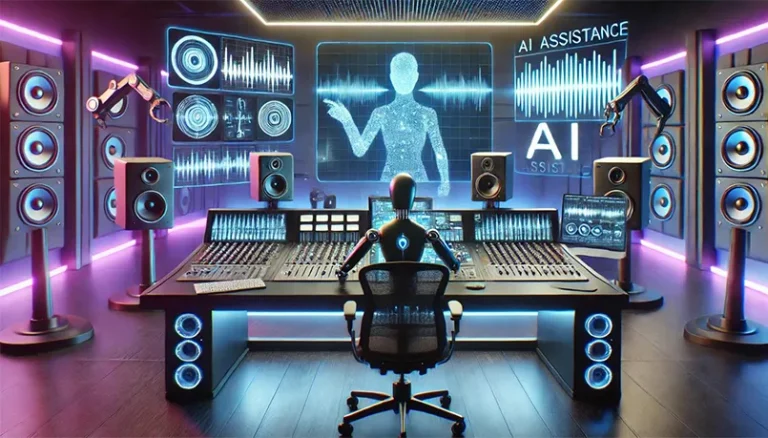In a world increasingly shaped by artificial intelligence, the realm of music creation has not remained untouched. From predictive algorithms curating playlists to advanced tools composing symphonies, the rise of the AI music generator is reshaping the music industry in ways once imagined only in science fiction. This technology is democratizing music production, empowering amateurs and professionals alike to compose and customize tracks with just a few clicks.
This article explores the phenomenon of AI-generated music, including how it works, its potential, its challenges, and its growing impact on everything from film scoring to independent music production.
What Is an AI Music Generator?
An AI music generator is a tool powered by machine learning and artificial intelligence that can create original music compositions without direct human input. These tools analyze vast datasets of music to learn structure, rhythm, harmony, and style, which allows them to generate melodies, harmonies, and even full orchestral arrangements.
Using advanced neural networks, some of these systems can even mimic specific genres, moods, or the style of certain composers or artists. Whether you’re a content creator needing background music or a music producer looking for inspiration, these tools are becoming indispensable.
How Does It Work?
At the core of an AI music generator is deep learning—particularly recurrent neural networks (RNNs) and transformer models. These AI systems are trained on thousands, if not millions, of audio files and musical scores. Over time, they learn the mathematical patterns that define different aspects of music, such as:
- Melody: Recognizing how pitch and rhythm combine to form memorable tunes.
- Harmony: Understanding chord progressions and how multiple notes can coexist.
- Structure: Grasping the layout of songs—verses, choruses, bridges, etc.
- Style: Imitating the nuances of various genres like jazz, rock, classical, or electronic.
Some advanced models even incorporate user feedback, continually improving based on preferences and corrections.
Applications of AI Music Generators
AI music generators are not just novelty tools; they serve real-world purposes in various domains:
1. Content Creation
Content creators, especially YouTubers and podcasters, often need royalty-free background music. Instead of hiring a composer or digging through stock music libraries, they can now generate custom tracks tailored to their content.
2. Film and Game Scoring
Game developers and filmmakers are tapping into AI tools to generate scores that adapt in real-time to player actions or scene changes, creating a more immersive experience.
3. Therapeutic and Wellness Music
AI-generated ambient tracks are being used in wellness apps for meditation, sleep, and relaxation. The music can be personalized based on user mood or physiological data.
4. Music Education
Students and educators use AI tools to understand music theory better, experiment with different compositions, and analyze the structural components of music in a more interactive way.
5. Music Production
Even seasoned producers use AI-generated melodies, chord progressions, and beats as a starting point or to overcome creative blocks.
Benefits of AI in Music Creation
1. Accessibility
One of the most transformative aspects of AI music generators is their accessibility. Even those with no formal training in music can compose beautiful, professional-sounding tracks.
2. Speed
What might take hours or days for a human to compose can be done in minutes using AI. This speed is especially useful in fast-paced industries like advertising and content creation.
3. Cost-Effective
Hiring musicians, renting studios, and producing music traditionally can be expensive. AI tools offer a budget-friendly alternative.
4. Creative Experimentation
AI allows users to experiment with styles and genres they might not usually explore. It opens doors to endless creative possibilities without the fear of wasting time or resources.
Limitations and Challenges
Despite its impressive capabilities, AI-generated music is not without limitations:
1. Lack of Emotional Depth
While AI can mimic musical patterns, many argue it still lacks the emotional intuition that human composers bring. Music often expresses feelings, stories, and cultural nuances that are hard to replicate with algorithms.
2. Ethical Concerns
There’s an ongoing debate about the ownership of AI-generated music. If a machine creates a song, who holds the copyright? The developer? The user? The AI itself?
3. Dependence
Some critics fear that over-reliance on AI could lead to a decline in traditional musicianship and creativity.
4. Quality Variability
Not all AI music tools are created equal. Some produce impressive results, while others generate music that sounds repetitive or unnatural.
The Evolution of AI Music Tools
The journey of AI in music began decades ago with basic rule-based systems. Today’s tools are far more sophisticated, thanks to massive advancements in AI technology.
Some of the milestones in the evolution of AI music include:
- Early Rule-Based Composers: Programs like EMI (Experiments in Musical Intelligence) developed in the 1980s could mimic the style of Bach or Mozart.
- Machine Learning Breakthroughs: The integration of machine learning in the 2010s allowed tools to learn music from data rather than pre-set rules.
- Deep Learning Models: Tools like Google’s Magenta and OpenAI’s MuseNet demonstrated how AI could compose coherent, multi-instrument pieces in a wide variety of genres.
Now, user-friendly platforms like Adobe’s AI music generator make it possible for anyone to generate custom soundtracks effortlessly.
The Rise of Personalized Music
Personalization is one of the most exciting features of AI music generators. Users can input parameters such as:
- Genre (pop, classical, EDM, etc.)
- Mood (happy, sad, romantic, energetic)
- Tempo and key
- Instrument preferences
The AI then generates a unique track tailored to these inputs. Some systems even allow you to hum or tap a rhythm, and the AI builds an entire composition around it.
Imagine waking up each day to a soundtrack composed just for you based on your calendar, weather, or mood—that’s the level of personalization AI is bringing to the table.
AI and Human Collaboration
Rather than replacing human musicians, many experts view AI as a collaborative partner. Some composers now use AI as a co-creator, leveraging it to generate initial ideas or even complete compositions which they then refine.
This symbiosis is similar to how photographers use Photoshop or how architects use CAD software—AI becomes a tool that enhances human creativity rather than stifling it.
Famous Examples and Real-World Adoption
Several notable musicians and companies have embraced AI in music creation:
- Taryn Southern released an entire album (“I AM AI”) composed using AI tools.
- YACHT, an American band, used AI to reimagine one of their albums.
- Endlesss is an app that allows collaborative music creation with AI.
- Amper Music, one of the early players, provides tools for video creators and marketers.
- AIVA (Artificial Intelligence Virtual Artist) is used in gaming, advertising, and film production.
Even big-name brands in advertising and marketing now rely on AI-generated music to ensure rapid content delivery.
AI Music in Education and Learning
Music education is evolving rapidly thanks to AI. Educators now use AI-driven platforms that:
- Offer real-time feedback to music learners
- Generate exercises based on individual weaknesses
- Compose examples to illustrate specific musical concepts
- Encourage creativity in young learners without overwhelming them with complex theory
With AI tools, schools can offer a richer, more inclusive music curriculum even if they lack access to traditional instruments or trained staff.
How to Choose the Right AI Music Tool
With dozens of platforms out there, selecting the right AI music generator can be daunting. Here are some key factors to consider:
1. User Interface
Choose a platform with an intuitive interface that matches your experience level.
2. Customization
Look for tools that allow you to tweak tempo, key, mood, and genre.
3. Export Options
Ensure the tool offers high-quality downloads in formats like MP3 or WAV.
4. Licensing
Always review the terms of use—especially if you plan to use the music commercially.
5. Support and Updates
A good platform should offer support and regular updates to stay current with music trends and user needs.
One standout tool offering a user-friendly experience with powerful features is Adobe’s AI music generator, which provides intuitive design and customizable results tailored for creators of all types.
Future Trends in AI Music
The future of AI-generated music is bright and buzzing with innovation. Here are some trends we can expect:
1. Real-Time Generation
As processing speeds improve, real-time music generation for gaming and interactive media will become standard.
2. Emotion-Aware Composition
Future tools may read user facial expressions, voice tones, or biometric data to generate emotionally resonant music in real time.
3. Cross-Genre Fusion
AI will explore and combine rare musical styles from different cultures, creating innovative new genres.
4. Blockchain for Ownership
With growing debates on music ownership, blockchain might play a key role in verifying and distributing royalties for AI-generated tracks.
5. AI as a Music Teacher
Imagine learning piano or guitar with a virtual AI teacher who composes new practice pieces just for you based on your strengths and weaknesses.
Final Thoughts
AI music generators are not just another passing tech trend—they’re fundamentally changing the way we create, consume, and think about music. They empower creativity, save time and cost, and open up new possibilities for innovation.
Yet, as with any tool, the best results come when AI is used in harmony with human imagination. While machines can analyze patterns and reproduce sounds, it’s human experience and emotion that give music its soul. Together, they form a powerful duet capable of reshaping the future of music.
Whether you’re a seasoned producer, a student of music, or a curious creator looking to explore new possibilities, the AI music generator is a groundbreaking resource that’s worth your attention.

